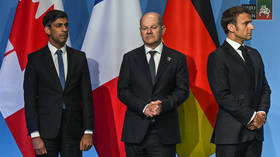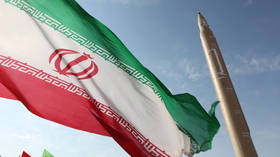Dmitry Trenin: Europe will eventually have to choose between the US and BRICS

Just two decades ago, for the first time ever, the great continent of Eurasia was dominated by one power – which, as it happened, wasn’t even Eurasian itself. Indeed, in the continent’s West, NATO, led by the US, was going through a Big Bang expansion, admitting seven new members between the Baltic, the Black Sea, and the Adriatic. US-inspired and -supported color revolutions, first in Georgia and then in Ukraine, were pointing to the next candidates to join the alliance. In the south of Eurasia, the United States, having invaded Iraq, was ruling the region supreme from Baghdad. Having routed the Afghan Taliban, US forces were also entrenched in Kabul, supported as they were by military bases in the neighboring Central Asian nations, Uzbekistan and Kyrgyzstan.
Of Eurasia’s own premier powers, China was happily integrating into the global economy, where the Washington consensus was still law; India was shedding the last vestiges of Fabian socialism, and ready to embrace globalization, which logically prioritized relations with America; and Russia, recovering from the economic, social and technological collapse that resulted from the downfall of the Soviet Union, was still hoping to build strategic partnerships with the US and NATO. American power was at its peak; Washington literally had the world in its hands.
Alas, the US, the only power in world history to achieve the position of a global hegemon while unchallenged by any other major player, has miserably misused its mightily strong hand – and its vaunted soft power. Rather than setting out to organize a genuine multipolar system based on mutual recognition of each nation’s core interests, with itself, at least initially, as a primus inter pares (which would be Franklin D Roosevelt’s method), it proceeded to enhance its exclusive and comprehensive dominance. Washington was pushing Russia ever harder with each step in NATO’s creeping enlargement to the east; it wrecked arms control with Moscow and the nuclear deal with Tehran; and it continued to constantly provoke China over Taiwan – while launching a trade and technology war against Beijing to hamstring its prime economic competitor.
In the meantime, Russia, India and China – the three leading non-Western countries in Eurasia, as well as many of the continent’s other important independent players, continued to rise economically, as well as consolidate their cooperation. In purchasing-power terms, they currently represent, respectively, the fourth-, -third, and the top largest economies in the world. For about a decade, China has been also promoting its massive Belt and Road Initiative; India began exploring and then expanding its world role; and Russia, with four other former Soviet republics, built a Eurasian Economic Union.
Moscow, Beijing, and Delhi, along with Brasilia, became the founding members of BRICS. This year, at the BRICS summit in Russia’s Kazan, the group will for the first time include the leaders of Iran, Egypt, Ethiopia, Saudi Arabia, and the United Arab Emirates. Another major Eurasian institution is the Shanghai Cooperation Organization (SCO), which began as a forum for China, Russia, and the Central Asian states, but now includes also India, Pakistan, and Iran, with Belarus to be admitted soon. A number of other Eurasian countries, from Turkey to Thailand and from the Maldives to Mongolia, have voiced their intention to join either BRICS or SCO.
To counter that trend among the members of what we increasingly call the World Majority, Washington has raised the profile of NATO in the Indo-Pacific; strengthened its Cold War-era bilateral and trilateral alliances in the Western Pacific, and founded a new one, AUKUS, in the South Pacific. The Americans are also seeking to cultivate India, as a pivotal great power, within the Quad group. All these multiple arrangements are completely dominated by the US and are aimed at containing and deterring Washington’s designated primary adversaries: China, Russia, Iran, and North Korea – with one overriding goal of defending America’s hegemonic position.
In contrast to that, neither BRICS nor the SCO is dominated by a single power, or a tandem/triumvirate of nations. BRICS’s recent expansion also suggests that it does not aspire to become a version of the West’s G7, as an elitist steering group, or directoire, for the non-Western world. The SCO includes no less than four nuclear powers, each of which pursues a clearly independent foreign policy, inspired by a distinct mode of strategic thinking and serving a set of well-defined national interests. Indeed, the BRICS/SCO diplomatic culture features sovereign equality, dialogue, respect for national interests and civilizational values, and consensus.
Neither BRICS nor the SCO is overtly anti-American or anti-Western: their main focus is internal rather than external, and they have their work cut out for them. Of course, Russia, China, India, Iran and others insist on doing business without outside interference, not to speak of foreign diktat. They don’t want to dominate Eurasia: they live there, it is their home – unlike the ever-restless “indispensable nation” thousands of miles away. In Ukraine, the main issue for Russia has been national security, not some “resurrection of an empire”; in Taiwan, Beijing has advocated national reunification on a version of the Hong Kong model, again a far cry from an imperial design.
Yet, Americans have a good reason to fear Russia prevailing in Ukraine. This will deal a heavy blow to their leadership position inside the Western bloc, as well as to their residual hegemonic role elsewhere in the world. Washington would not take this lightly, and can be relied upon to do everything in its power to prevent it. Apart from the 16,000 sanctions imposed so far on Russia, and the hundreds of billions of dollars spent on the war in Ukraine, the US and its friends will try to drive wedges among BRICS/SCO nations, and undermine the domestic positions of leaders not to their liking – something they are experienced in and well-equipped for.
One obvious issue the US will exploit is the Sino-Indian relations, which could give them a chance to turn Delhi against Beijing, and to weaken Indo-Russian relations. So far, they haven’t succeeded: much as Indians need foreign investment and advance technology to fully develop their nation’s vast potential, they see their country as a great power, not an instrument in someone’s schemes. With Indian self-image and self-esteem rising fast, it is hard to imagine that Delhi will do Washington’s bidding.
The countries of Eurasia have little to fear from Russia achieving its goals in Ukraine. The emerging mutual security space within the SCO will make the continent – minus Western Europe, for the time being – far more stable, whether in terms of strategic stability in major-power relations, regional security systems (like the one proposed by Russia in the Gulf), or the risks of terrorism. New financial arrangements within the BRICS group will make dollar-free transactions among the members safer; new Eurasia-wide logistics can provide for better connectivity within the world’s largest and most diverse continent. Eventually, the countries of Western Europe – or far western Eurasia, if you like – will have to make a choice between staying in the US orbit as America’s power continues to shrink, or reaching out east to a vast and vibrant new world next door.
















